Australians not satisfied with Internet connection: Ipsos survey

Global @dvisor Infrastructure Index 2016 revealed in its study that only 38 percent of Australians agreed that the country's broadband was very or fairly good.
There were 1,000 adult Australians participated in the survey between ages 16-64. The survey was conducted through the Ipsos Online Panel system on Aug. 26 to Sep. 9. There were 25 other countries that participated in the survey.
According to the study, the global average for broadband satisfaction was 54 percent. South Koreans were the most satisfied broadband users with an average of 70 percent, while an average of 68 percent for Americans and Swedes.
The Telecommunications Industry Ombudsman revealed earlier in its statistics that it received 10,985 complaints about Internet services between January and March this year. The record showed that the major complaints were slow data speeds, connection delay and unusable services.
The survey also covered the satisfaction of the participants on other infrastructures in their country. In Australia, the most favoured infrastructures were the airports, with 69 percent of very or fairly good rating, followed by the water supply and sewerage with 67 percent. The lowest favoured infrastructures were energy generation infrastructure with 38 percent, followed by flood defences with 38 percent. The new housing supply, rail infrastructure and motorways/major road networks were rated with below 50 percent.
“This survey shows instinctive backing for the Government’s infrastructure building and recognition of its importance to economic growth. Interestingly, despite the desire for improved infrastructure there is some reluctance for this to be achieved through Government borrowing or foreign investment. Both of these may be driven by Government and media messaging in recent years. Ipsos Social Research Institute Director – NSW, David Elliott, commented on the findings.
“Regardless, the community is clear on the desire to be heard and for local communities to be involved in decision making. To help Australia build more and better infrastructure, our leaders need to consult with citizens, customers and communities to understand the things that matter and, of course, deliver on the promises and potential.





















